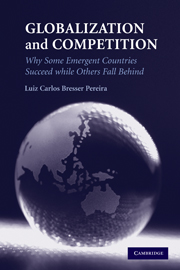Crossref Citations
This Book has been
cited by the following publications. This list is generated based on data provided by Crossref.
Bresser-Pereira, Luiz Carlos
2010.
The global financial crisis, neoclassical economics, and the neoliberal years of capitalism.
Revue de la régulation,
Vol. 7,
Issue. ,
2012.
Books Received.
Review of Radical Political Economics,
Vol. 44,
Issue. 1,
p.
124.
Ebenau, Matthias
and
Liberatore, Victoria
2013.
Neodevelopmentalist state capitalism in Brazil and Argentina: chances, limits and contradictionsh.
dms – der moderne staat – Zeitschrift für Public Policy, Recht und Management,
Vol. 6,
Issue. 1-2013,
p.
105.
Scott, James
2015.
The Role of Southern Intellectuals in Contemporary Trade Governance.
New Political Economy,
Vol. 20,
Issue. 5,
p.
633.
Nikiforos, Michalis
Carvalho, Laura
and
Schoder, Christian
2015.
“Twin deficits” in Greece: in search of causality.
Journal of Post Keynesian Economics,
Vol. 38,
Issue. 2,
p.
302.
Arestis, Philip
and
Baltar, Carolina Troncoso
2017.
The Brazilian Economy since the Great Financial Crisis of 2007/2008.
p.
191.
Bresser-Pereira, Luiz Carlos
2020.
New and Classical Developmentalism compared: a response to Medeiros.
Review of Keynesian Economics,
Vol. 8,
Issue. 2,
p.
168.
Angel, Alejandro
2021.
Consolidating Economic Governance in Latin America.
p.
57.
Jenss, Alke
Lehmann, Rosa
and
Boos, Tobias
2021.
Sozialstrukturen in Lateinamerika.
p.
1.
Galbraith, James K.
2022.
The Dollar System in a Multi-Polar World.
International Journal of Political Economy,
Vol. 51,
Issue. 4,
p.
321.
Nölke, Andreas
May, Christian
Mertens, Daniel
and
Schedelik, Michael
2022.
Elephant limps, but jaguar stumbles: Unpacking the divergence of state capitalism in Brazil and India through theories of capitalist diversity.
Competition & Change,
Vol. 26,
Issue. 3-4,
p.
311.
Chaia De Bellis, Jonás
2023.
Más Estado y más mercado: las estatizaciones kirchneristas en el programa neo-desarrollista (2003-2015).
Ciencia Política,
Vol. 17,
Issue. 34,
p.
45.
May, Christian
Mertens, Daniel
Nölke, Andreas
and
Schedelik, Michael
2023.
Politische Ökonomie.
p.
19.



